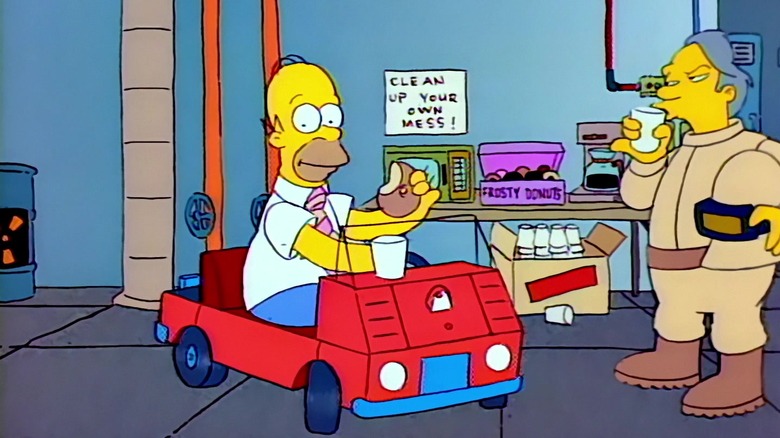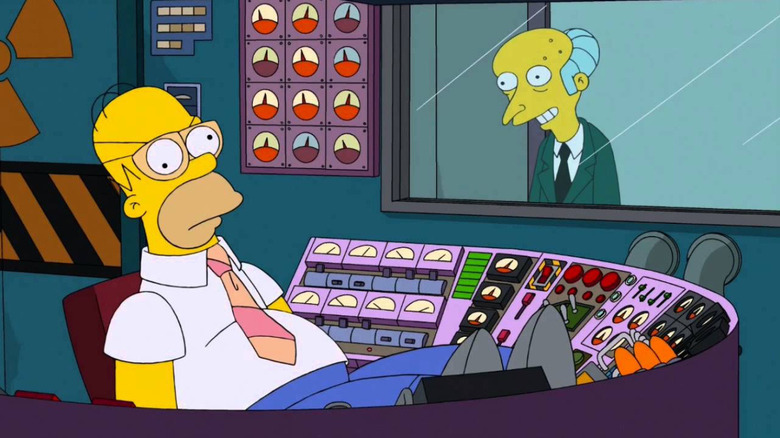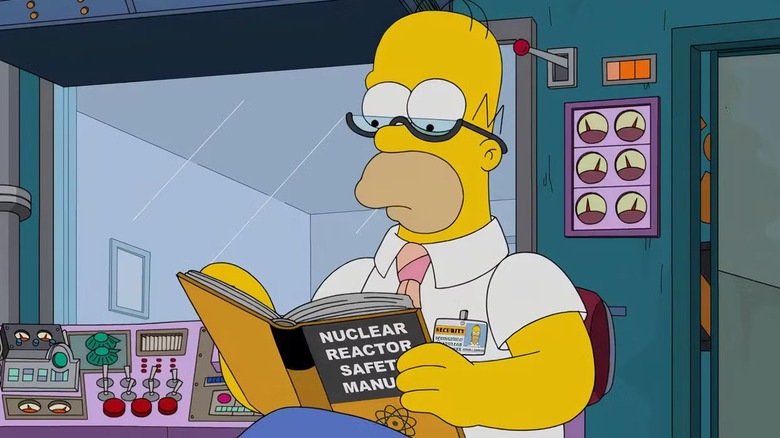Nuclear Power Plant Boss Blames The Simpsons For The Public's Negative View Of Nuclear Energy
"The Simpsons" is a progressive show by most standards. Its voice-of-reason character is young liberal vegetarian Lisa Simpson (Yeardley Smith), for instance, and it was airing episodes supporting queer rights and even dismantling the groomer narrative years before that was a safe thing to do. As a franchise, "The Simpsons" is especially passionate when it comes to the environment, with the entire plot of "The Simpsons Movie" revolving around the importance of stopping lake pollution.
But although "The Simpsons" loves the environment, it did contribute to perhaps one of the most harmful eco trends in the entire late 20th century: trashing nuclear power. After all, the show's main character works as a safety inspector at a power plant despite being unqualified for the job, while the plant's owner is a comically evil and corrupt baron who dumps toxic sludge into local parks to save a few pennies.
Nuclear energy is bad, the show's made clear, which is unfortunate because the United States' current carbon footprint could've been lowered significantly if we hadn't backed away so strongly from nuclear power. Most recently, my home state in New York has shut down its nuclear power plant, Indian Point Energy Center, allegedly for environmental protection reasons; the result's been that New York's decarbonization efforts have been severely set back, with dirty energy like fossil fuels being used to make up for the drop in nuclear-powered electricity. (The good news: The new governor seems to be back on board with nuclear energy, so New York hopefully won't make this mistake again.)
Of course, "The Simpsons" is just a comedy show. But although the series is making a joke, not everyone in the nuclear industry is laughing. Julia Pyke, joint managing director of a nuclear plant currently in construction in the UK, has called out "The Simpsons" for its fear-mongering ways. As she explained on BBC Radio 4's Woman's Hour, "I definitely think 'The Simpsons,' which I very much enjoy, has done the nuclear industry a big disservice. [...] I am not Mr. Burns."
When nuclear power plant bosses say they're not Mr. Burns, we should probably believe them
Pyke further defended the construction of nuclear power plants, arguing that the biggest obstacle to governments embracing nuclear energy is not the risk of disaster but the public perception that there's a risk of disaster. As she explained:
"We have to better communicate the social benefits of nuclear power and what it is going to contribute to society, focusing on opportunities for people. [...] Nuclear is one of the safest ways of making electricity, and it is a bit like the fly-drive analogy — people worry about flying, but, statistically, it is extremely safe. [...] We need to move to much more emotionally-resonant ways of communication so people feel much warmer towards the industry."
The odds of a serious nuclear power plant accident are indeed significantly lower than the average person thinks, as are the chances of it having a catastrophic environmental impact. Especially with improved technology, nuclear plants are not at risk of blowing up their surrounding town at any moment, nor will they lead to any three-eyed fish swimming in a local lake. (It's also worth clarifying that the radiation from a nuclear power plant will not turn the local townspeople into yellow-skinned, four-fingered monstrosities.) Nuclear power plants lead to cheaper, cleaner energy overall, something surely most people can get on board with.
The Simpsons didn't start the anti-nuclear wave, the anti-nuclear wave started The Simpsons
The good news for Pyke is that "The Simpsons" already seems to have figured this all out on its own in recent seasons. The season 35 premiere established that Homer Simpson (Dan Castellaneta) is not the plant's actual safety inspector; rather, his job is basically a fake one given to him out of pity while the rest of the competent employees do the real work to keep everyone safe. Not every fan loved this revelation (mainly because it spits in the face of decades of "Simpsons" lore), but at least this paints a kinder, safer picture of nuclear energy.
It's also worth remembering that the public image of nuclear energy was already in the pits back in 1989 when "The Simpsons" premiered. Recall that this was 10 years after the Three Mile Island accident and just three years after the Chernobyl disaster. The premiere also aired not long after the end of the Cold War; that was a decades-long period where fears of nuclear annihilation were rampant, and where the very word "nuclear" brought to mind mass destruction first, near-limitless energy second.
The "Simpsons" writers didn't pick a nuclear plant as Homer's job because they hated nuclear power; they did so because the public already hated nuclear power and they wanted an easy way to signal that Homer had a rough life. It also functions as a uniquely interesting job for a sitcom lead to have, allowing the show's creatives to raise the stakes to apocalyptic levels whenever they feel like it and letting the absurdity of Homer's buffoonery hit new heights. Sure, "The Simpsons" may have indirectly contributed to the U.S. being prevented from reaching an age of abundant energy, and yes, that may have been the tipping point that doomed the world into a climate catastrophe, but honestly, the jokes were so good I say let's give it a pass.


